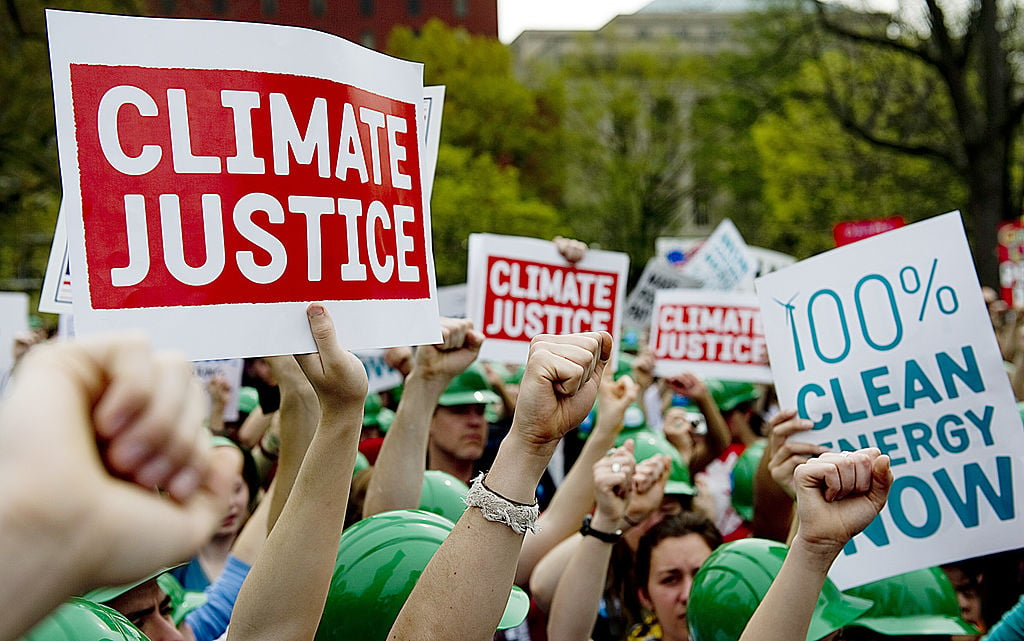Part of the Series
Covering Climate Now
The leaders of a years-long Congressional probe into Big Oil’s decades-long climate disinformation campaigns just formally referred their investigation to the Department of Justice, calling on the nation’s biggest public law office to “pursue further investigation and take any appropriate legal action, as it has in similar cases involving the tobacco and pharmaceutical industries.”
In a letter sent to U.S. Attorney General Merrick Garland on Wednesday, Senate Budget Chair Sheldon Whitehouse and House Oversight and Accountability Ranking Member Jamie Raskin wrote that they believe that “there is adequate evidence that fossil fuel industry companies and trade associations may have violated one or more federal statutes and that, accordingly, further investigation is warranted.”
The referral comes after the committees released a joint report at the end of April that unveiled thousands of “new documents exposing the fossil fuel industry’s role in spreading climate disinformation and preventing action on climate change.” The documents, revealing oil giants’ internal strategies to greenwash their climate records and downplay the harms of “natural” gas while further investing in fossil fuel production, came out of a House Oversight Committee investigation into ExxonMobil, Chevron, Shell, BP, the American Petroleum Institute, and the U.S. Chamber of Commerce, that began in 2021.
At a hearing on May 1, former DOJ attorney Sharon Eubanks, who led the Justice Department’s case against Big Tobacco, testified that “Just as the Department of Justice investigated the tobacco industry and ultimately filed a civil racketeering complaint against the industry, given the similarities of the fraudulent acts, and the government’s successful case against tobacco, there is adequate foundation for building a case… We should not waste any more time wringing our hands about what can be done.”
Whitehouse and Raskin announced the referral at a press conference yesterday, where Whitehouse called on the Justice Department to “commence a proper inquiry into whether charges should be brought and what charges should be brought” against Big Oil and made the comparison to civil racketeering charges the department brought against the tobacco industry.
“The end result was that the [tobacco] industry was ordered to stop future fraudulent statements and correct fraudulent statements,” he said, before reading Judge Gladys Kessler’s famous ruling against Philip Morris and other tobacco majors, slightly altered to replace references to those companies with mentions of climate change and Big Oil. “The complaint writes itself,” he said.
Following Congress’s investigation, Raskin emphasized the importance of an effort by the executive branch, which “takes care that the laws are faithfully executed and implemented,” to take accountability efforts to another level and provide a “second chance for America and the world to address the climate crisis.”
“If there’s no accountability, and there’s no truth, then there’s no progress,” Raskin said today. “The deception and the deceit must end for us to seriously confront the magnitude of the climate crisis that we are in.”
Fossil fuel majors have kept members of Congress busy since that latest hearing on May 1. Last week, Raskin used his position as ranking Oversight Committee member to request documents from several oil and gas companies — including Exxon and Chevron — whose executives were reportedly offered major tax breaks and policy rewards in exchange for $1 billion in campaign donations by Donald Trump. “Media reports raise significant potential ethical, campaign finance, and legal issues that would flow from the effective sale of American energy and regulatory policy to commercial interests in return for large campaign contributions,” he wrote in a letter to the companies’ bosses.
Lawmakers have been calling for a DOJ probe into Big Oil for nearly a decade. Those calls grew even louder last year, when Representative Ted Lieu and Senator Richard Blumenthal led more than a dozen U.S. representatives and senators in a letter calling for Attorney General Garland to look into “Shell, ExxonMobil, and potentially other fossil fuel companies to determine whether their coordinated campaigns of climate change deception violated federal law.” After new evidence was uncovered of Shell’s early knowledge and subsequent denial about the dangers its products would cause, Lieu told ExxonKnews in January that those requests were “even more urgent.”
The referral is the latest sign that legal pressure against Big Oil is mounting, as the state of Michigan prepares to sue the industry for climate damages, accountability lawsuits brought by Anne Arundel and Annapolis were just greenlit for pre-trial discovery by a Maryland judge, and the companies are pleading the Supreme Court to bail them out.
Last year, the DOJ reversed the previous administration’s support of oil companies in fighting climate accountability cases filed by state and local governments, throwing its support behind the communities on a procedural issue after U.S. senators, state attorneys general, and even lawmakers from Biden’s home state urged them to.
But Whitehouse and Raskin’s plea is for the Justice Department to go further and launch its own actions to hold the fossil fuel industry accountable. Whether Merrick Garland and the Justice Department will be responsive remains to be seen.
A critical message, before you scroll away
You may not know that Truthout’s journalism is funded overwhelmingly by individual supporters. Readers just like you ensure that unique stories like the one above make it to print – all from an uncompromised, independent perspective.
At this very moment, we’re conducting a fundraiser with a goal to raise $37,000 in the next 5 days. So, if you’ve found value in what you read today, please consider a tax-deductible donation in any size to ensure this work continues. We thank you kindly for your support.
